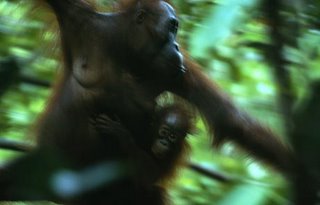Less well-publicised, but equally dramatic, has been the decline in orangutans, whose distribution is limited to parts of Sumatra and Borneo.
 Using the largest-ever genetic sample from wild orangutan populations, an international team from France, Malaysia, the US and UK, have shown strong evidence for a recent demographic collapse in North Eastern Borneo.
Using the largest-ever genetic sample from wild orangutan populations, an international team from France, Malaysia, the US and UK, have shown strong evidence for a recent demographic collapse in North Eastern Borneo.This is the first time its been demonstrated that genetic data can detect and quantify the effect of recent, human-induced deforestation and habitat fragmentation on an endangered species.
The orangutan populations studied inhabit the Lower Kinabatangan floodplain in Eastern Sabah, a region that has experienced large-scale commercial timber exploitation and agriculture since the mid-1950s. Faecal and hair samples were collected from wild orangutans; over 200 different animals were genetically identified using 14 microsatellites.
The genetic diversity of the population showed a very strong signal of a massive population decline - suggesting that a population crash occurred during the past 200 years, coinciding with deforestation in the same area.
In recent years, conservationists have linked the orangutans' decline to forest clearance for palm oil plantations, which produce the raw materials used for products like lipstick and soap.
Orangutan numbers are now down to just around 50,000. Considering the fact that Kinabatangan is just one orangutan habitat afflicted with these problems, the larger picture of population decline across their entire range is a very serious cause for concern.

The researcher findings emphasise the need to re-establish corridors between fragmented forest patches. And it may be even necessary to move orangutans around to prevent inbreeding.
If current trends are to continue unabated, the outlook is certainly grim for the species. In a recent estimate, WWF predicts that Orangutans may become extinct by 2025.


No comments:
Post a Comment